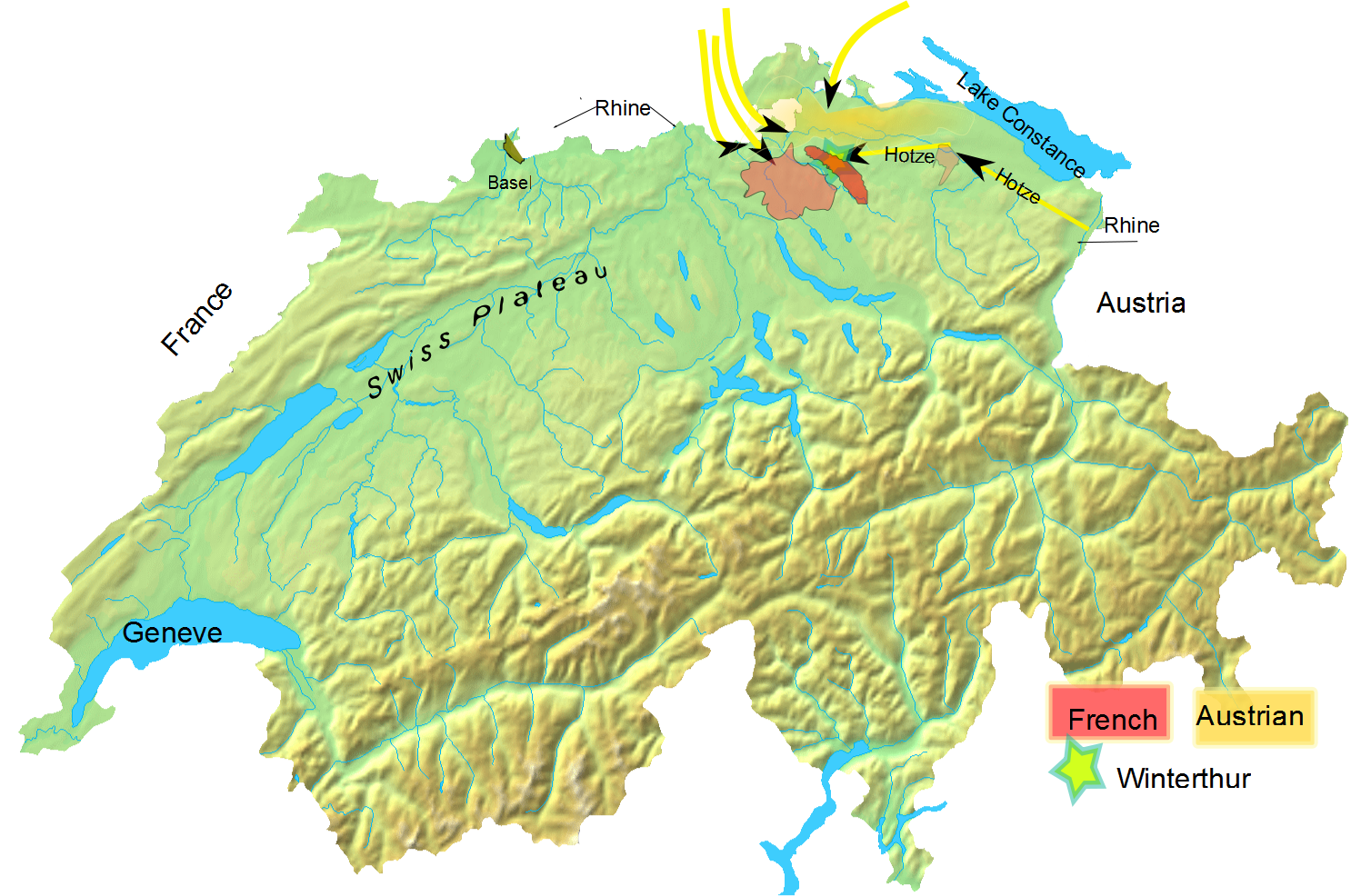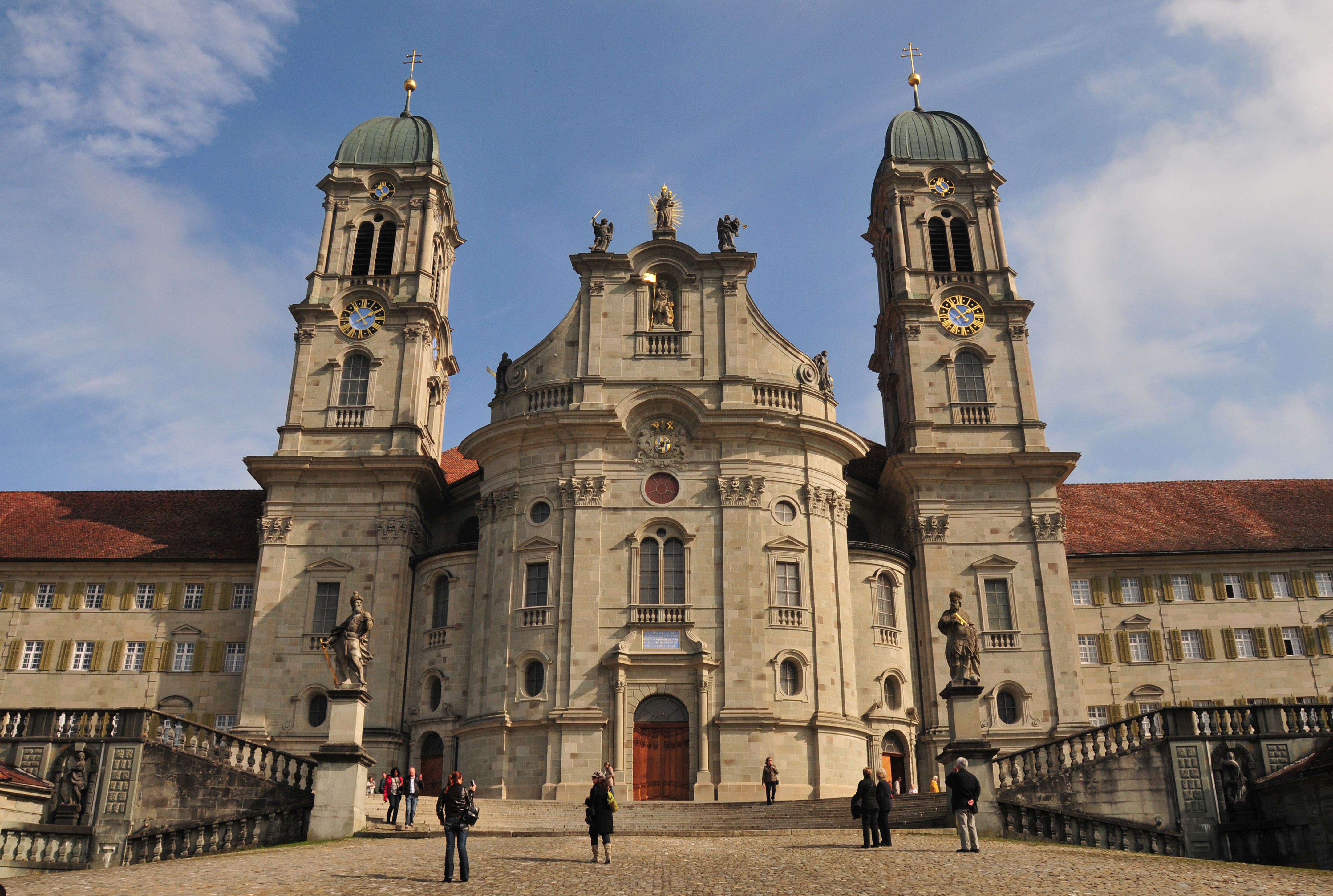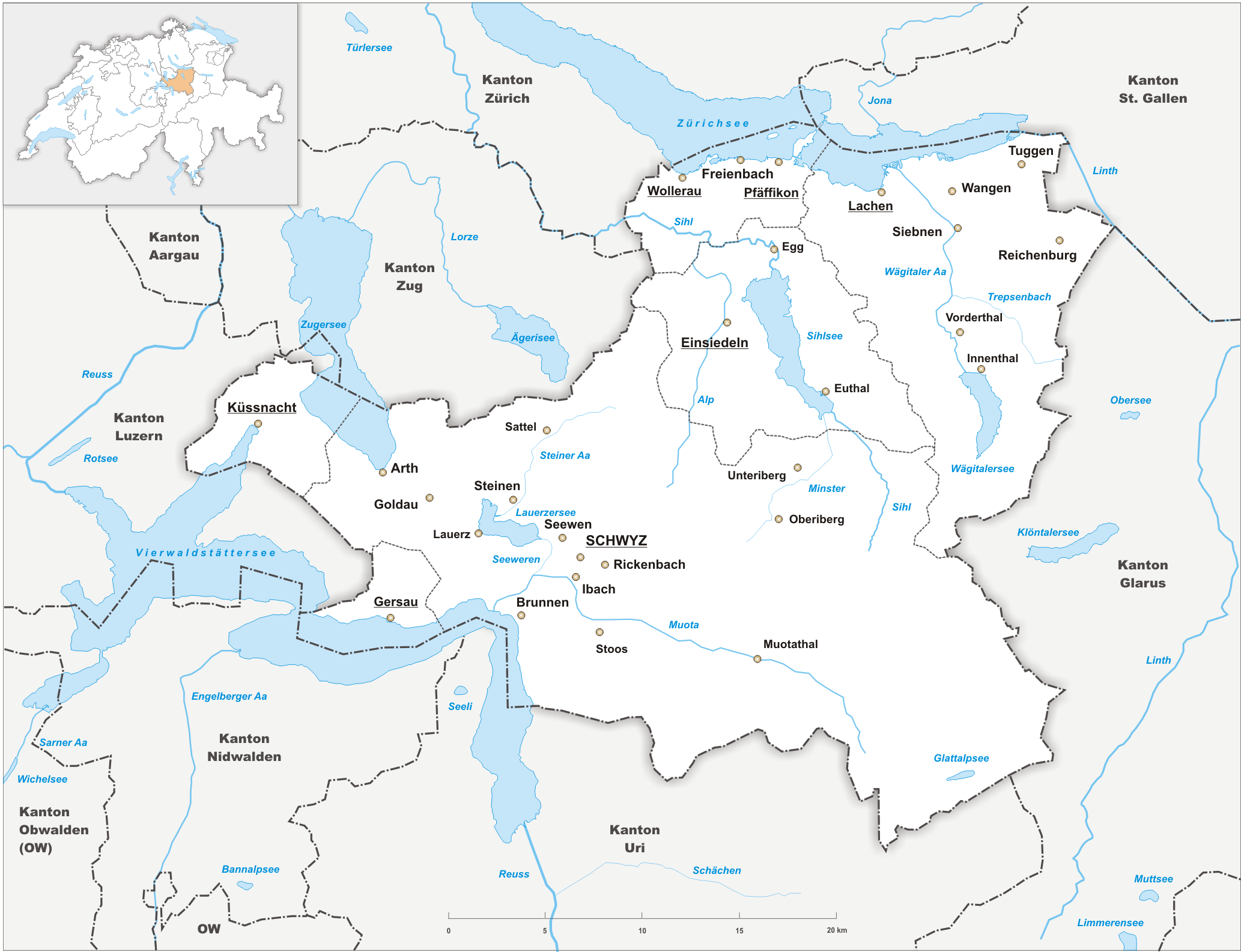|
Joseph Thomas Fassbind
Joseph Thomas Fassbind (1755ŌĆō1824) was a pastor and historiographer of Schwyz. He was educated at Einsiedeln, Bellinzona, Como and Besan├¦on. In 1798 he was convicted of treason for his refusal to vow loyalty to the Helvetic Republic, and exiled to Engelberg monastery. He returned from exile in 1800 and became pastor of Schwyz in 1803. Fassbind is best known for his ''vaterl├żndische Profangeschichte'', an account of the history of the canton of Schwyz from the Roman to the Napoleonic era, published posthumously in five volumes as ''Geschichte des Kantons Schwyz'' during the 1830s (a new edition with commentary appeared in 2005). Of particular interest are his eyewitness accounts of the events of the War of the Second Coalition during his own time. Fassbind's anti-French opinions led him to welcome the Russian invasion of the Helvetic Republic, and his description of the troops of Alexander Suvorov Alexander Vasilyevich Suvorov (russian: ąÉą╗ąĄą║čüą░╠üąĮą┤čĆ ąÆą░čüąĖ╠üą╗č ... [...More Info...] [...Related Items...] OR: [Wikipedia] [Google] [Baidu] |
Schwyz
The town of Schwyz (; french: Schwytz; it, Svitto) is the capital of the canton of Schwyz in Switzerland. The Federal Charter of 1291 or ''Bundesbrief'', the charter that eventually led to the foundation of Switzerland, can be seen at the ''Bundesbriefmuseum''. The official language of Schwyz is (the Swiss variety of) German, but the main spoken language is the local variant of the Alemannic Swiss German dialect. Name The earliest certain record of the name dates to 972, recorded in Medieval Latin as '. There are a number of uncertain records dated between 924 and 960, in the form ''Swites'' (''Suuites'') and ''Switz''. The name is recorded as ''Schwitz'' in the 13th century, and in the 17th to 18th century often as ''Schweitz''. The name's etymology is uncertain. It was long presented as derived from the name of an eponymous founder in Swiss legend, one ''Suito'' or ''Switer'', an explanation found in Swiss school textbooks until the first half of the 20th century. ... [...More Info...] [...Related Items...] OR: [Wikipedia] [Google] [Baidu] |
War Of The Second Coalition
The War of the Second Coalition (1798/9 ŌĆō 1801/2, depending on periodisation) was the second war on revolutionary France by most of the European monarchies, led by Britain, Austria and Russia, and including the Ottoman Empire, Portugal, Naples and various German monarchies. Prussia did not join this coalition, and Spain supported France. The overall goal of Britain and Russia was to contain the expansion of the French Republic and restore the monarchy in France, whereas Austria, still weakened and in deep financial debt from the War of the First Coalition, primarily sought to recover its position and come out of the war stronger than it entered. Due in important part to this difference in strategy among the three major allied powers, the Second Coalition failed to overthrow the revolutionary regime, and French territorial gains since 1793 were confirmed. In the FrancoŌĆōAustrian Treaty of Lun├®ville in February 1801, France held all its previous gains and obtained new land ... [...More Info...] [...Related Items...] OR: [Wikipedia] [Google] [Baidu] |
19th-century Swiss Historians
The 19th (nineteenth) century began on 1 January 1801 ( MDCCCI), and ended on 31 December 1900 ( MCM). The 19th century was the ninth century of the 2nd millennium. The 19th century was characterized by vast social upheaval. Slavery was abolished in much of Europe and the Americas. The First Industrial Revolution, though it began in the late 18th century, expanding beyond its British homeland for the first time during this century, particularly remaking the economies and societies of the Low Countries, the Rhineland, Northern Italy, and the Northeastern United States. A few decades later, the Second Industrial Revolution led to ever more massive urbanization and much higher levels of productivity, profit, and prosperity, a pattern that continued into the 20th century. The Islamic gunpowder empires fell into decline and European imperialism brought much of South Asia, Southeast Asia, and almost all of Africa under colonial rule. It was also marked by the collapse of the large ... [...More Info...] [...Related Items...] OR: [Wikipedia] [Google] [Baidu] |
19th-century Swiss Roman Catholic Priests
The 19th (nineteenth) century began on 1 January 1801 ( MDCCCI), and ended on 31 December 1900 ( MCM). The 19th century was the ninth century of the 2nd millennium. The 19th century was characterized by vast social upheaval. Slavery was abolished in much of Europe and the Americas. The First Industrial Revolution, though it began in the late 18th century, expanding beyond its British homeland for the first time during this century, particularly remaking the economies and societies of the Low Countries, the Rhineland, Northern Italy, and the Northeastern United States. A few decades later, the Second Industrial Revolution led to ever more massive urbanization and much higher levels of productivity, profit, and prosperity, a pattern that continued into the 20th century. The Islamic gunpowder empires fell into decline and European imperialism brought much of South Asia, Southeast Asia, and almost all of Africa under colonial rule. It was also marked by the collapse of the large ... [...More Info...] [...Related Items...] OR: [Wikipedia] [Google] [Baidu] |
1824 Deaths
Eighteen or 18 may refer to: * 18 (number), the natural number following 17 and preceding 19 * one of the years 18 BC, AD 18, 1918, 2018 Film, television and entertainment * ''18'' (film), a 1993 Taiwanese experimental film based on the short story ''God's Dice'' * ''Eighteen'' (film), a 2005 Canadian dramatic feature film * 18 (British Board of Film Classification), a film rating in the United Kingdom, also used in Ireland by the Irish Film Classification Office * 18 (''Dragon Ball''), a character in the ''Dragon Ball'' franchise * "Eighteen", a 2006 episode of the animated television series ''12 oz. Mouse'' Music Albums * ''18'' (Moby album), 2002 * ''18'' (Nana Kitade album), 2005 * '' 18...'', 2009 debut album by G.E.M. Songs * "18" (5 Seconds of Summer song), from their 2014 eponymous debut album * "18" (One Direction song), from their 2014 studio album ''Four'' * "18", by Anarbor from their 2013 studio album '' Burnout'' * "I'm Eighteen", by Alice Cooper commonly ... [...More Info...] [...Related Items...] OR: [Wikipedia] [Google] [Baidu] |
1755 Births
Events January–March * January 23 (O. S. January 12, Tatiana Day, nowadays celebrated on January 25) – Moscow University is established. * February 13 – The kingdom of Mataram on Java is divided in two, creating the sultanate of Yogyakarta and the sunanate of Surakarta. * March 12 – A steam engine is used in the American colonies for the first time as New Jersey copper mine owner Arent Schuyler installs a Newcomen atmospheric engine to pump water out of a mineshaft. * March 22 – Britain's House of Commons votes in favor of ┬Ż1,000,000 of appropriations to expand the British Army and Royal Navy operations in North America. * March 26 – General Edward Braddock and 1,600 British sailors and soldiers arrive at Alexandria, Virginia on transport ships that have sailed up the Potomac River. Braddock, sent to take command of the British forces against the French in North America, commandeers taverns and private homes to feed and house the t ... [...More Info...] [...Related Items...] OR: [Wikipedia] [Google] [Baidu] |
Alexander Suvorov
Alexander Vasilyevich Suvorov (russian: ąÉą╗ąĄą║čüą░╠üąĮą┤čĆ ąÆą░čüąĖ╠üą╗čīąĄą▓ąĖčć ąĪčāą▓ąŠ╠üčĆąŠą▓, Aleks├Īndr Vas├Łl'yevich Suv├│rov; or 1730) was a Russian general in service of the Russian Empire. He was Count of Rymnik, Count of the Holy Roman Empire, Prince of the Kingdom of Sardinia, Prince of the Russian Empire and the last Generalissimo of the Russian Empire. Suvorov is considered one of the greatest military commanders in Russian history and one of the great generals of the early modern period. He was awarded numerous medals, titles, and honors by Russia, as well as by other countries. Suvorov secured Russia's expanded borders and renewed military prestige and left a legacy of theories on warfare. He was the author of several military manuals, the most famous being ''The Science of Victory'', and was noted for several of his sayings. He never lost a single battle he commanded. Several military academies, monuments, villages, museums, and orders in Russia are dedicate ... [...More Info...] [...Related Items...] OR: [Wikipedia] [Google] [Baidu] |
Italian And Swiss Expedition (1799ŌĆō1800)
The Italian and Swiss expedition of 1799 was a military campaign undertaken by a combined Austro-Russian army under overall command of the Russian Marshal Alexander Suvorov against French forces in Piedmont and Lombardy (modern Italy) and the Helvetic Republic (present-day Switzerland). The expedition was part of the Italian campaigns of the French Revolutionary Wars in general, and the War of the Second Coalition in particular. It was one of 'two unprecedented Russian interventions in 1799', the other being the Anglo-Russian invasion of Holland (AugustŌĆōNovember 1799). Preparations The expedition was primarily planned by British and Russian politicians and diplomats. Russia would provide troops that Britain would subsidise, and together they sought to encourage Austria to do most of the fighting (as it had about three-fourths of the would-be Second Coalition's land forces), pay for its own troops as well as supply the entire allied army, while maintaining Anglo-Russian stra ... [...More Info...] [...Related Items...] OR: [Wikipedia] [Google] [Baidu] |
Switzerland In The Napoleonic Era
During the French Revolutionary Wars, the revolutionary armies marched eastward, enveloping Switzerland in their battles against Austria. In 1798, Switzerland was completely overrun by the French and was renamed the Helvetic Republic. The Helvetic Republic encountered severe economic and political problems. In 1798 the country became a battlefield of the Revolutionary Wars, culminating in the Battles of Zürich in 1799. In 1803 Napoleon's Act of Mediation reestablished a Swiss Confederation that partially restored the sovereignty of the cantons, and the former tributary and allied territories of Aargau, Thurgau, Graubünden, St. Gallen, Vaud and Ticino became cantons with equal rights. The Congress of Vienna of 1815 fully re-established Swiss independence and the European powers agreed to permanently recognise Swiss neutrality. At this time, the territory of Switzerland was increased for the last time, by the new cantons of Valais, Neuchâtel and Geneva. The Restoration, the t ... [...More Info...] [...Related Items...] OR: [Wikipedia] [Google] [Baidu] |
Einsiedeln
Einsiedeln () is a municipality and district in the canton of Schwyz in Switzerland known for its monastery, the Benedictine Einsiedeln Abbey, established in the 10th century. History Early history There was no permanent settlement in the area prior to the early medieval period, but numerous artefacts left by prehistoric hunters, dated to the Mesolithic to Bronze Age were recovered. The original " hermitage" is associated with St. Meinrad, a Benedictine monk family of the Counts of Hohenzollern. According to legend, Meinrad lived on the slopes of Mt. Etzel from 835 until his death in 861. During the next eighty years Saint Meinrad's hermitage was never without one or more hermits emulating his example. One of the hermits, named Eberhard, previously Provost of Strasburg, erected a monastery and church there, of which he became first abbot. Work on the monastery is said to have begun in 934. [...More Info...] [...Related Items...] OR: [Wikipedia] [Google] [Baidu] |
Switzerland In The Roman Era
The territory of modern Switzerland was a part of the Roman Republic and Empire for a period of about six centuries, beginning with the step-by-step conquest of the area by Roman armies from the 2nd century BC and ending with the Fall of the Western Roman Empire in the 5th century AD. The mostly Celtic tribes of the area were subjugated by successive Roman campaigns aimed at control of the strategic routes from Italy across the Alps to the Rhine and into Gaul, most importantly by Julius Caesar's defeat of the largest tribal group, the Helvetii, in the Gallic Wars in 58 BC. Under the ''Pax Romana'', the area was smoothly integrated into the prospering Empire, and its population assimilated into the wider Gallo-Roman culture by the 2nd century AD, as the Romans enlisted the native aristocracy to engage in local government, built a network of roads connecting their newly established colonial cities and divided up the area among the Roman provinces. Roman civilization began to ... [...More Info...] [...Related Items...] OR: [Wikipedia] [Google] [Baidu] |
Canton Of Schwyz
The canton of Schwyz (german: Kanton Schwyz rm, Chantun Sviz; french: Canton de Schwytz; it, Canton Svitto) is a canton in central Switzerland between the Alps in the south, Lake Lucerne to the west and Lake Z├╝rich in the north, centred on and named after the town of Schwyz. It is one of the founding cantons of Switzerland; Switzerland's name is derived from the name of the canton, and the flag of Switzerland from its coat of arms. For the history of the name, see Schwyz. The Swiss Federal Charter is on display in Schwyz. Northeast of the town of Schwyz is Einsiedeln Abbey. History Prehistory to the Roman era The earliest traces of humans in Schwyz are from the Upper Paleolithic and Early Mesolithic, or about 12,500 BC. An excavation of the karst caves in the valley of the Muota river (''Muotatal'') revealed numerous sites, some dating to the Younger Dryas period (c. 10,000 BC). The alpine meadows at B├Čdmeren, Tw├żrenen and Silberen were Stone Age hunter-gather ... [...More Info...] [...Related Items...] OR: [Wikipedia] [Google] [Baidu] |









